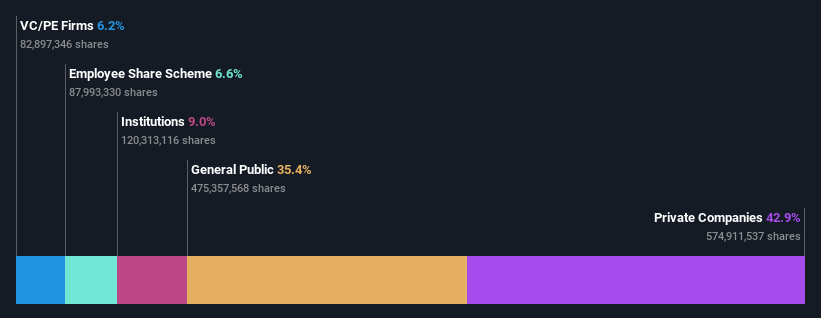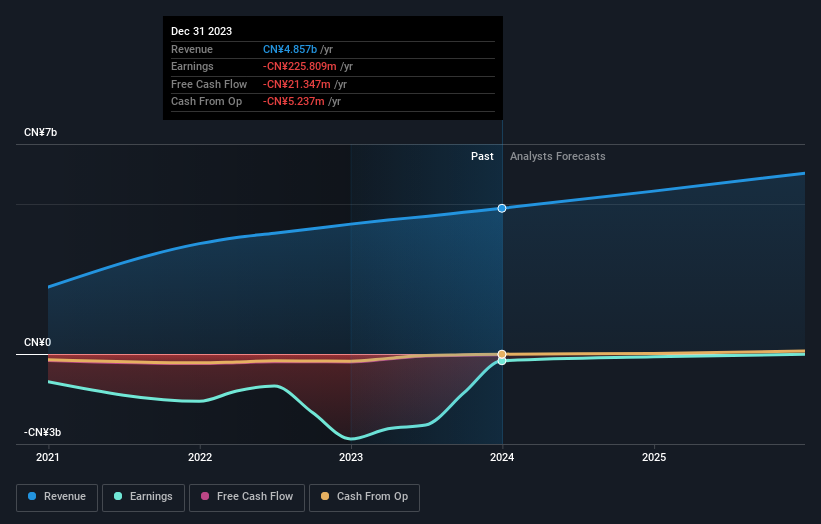- Hong Kong
- /
- Food and Staples Retail
- /
- SEHK:9886
Dingdang Health Technology Group Ltd.'s (HKG:9886) stock price dropped 18% last week; private companies would not be happy

Key Insights
- Significant control over Dingdang Health Technology Group by private companies implies that the general public has more power to influence management and governance-related decisions
- The top 4 shareholders own 56% of the company
- Ownership research, combined with past performance data can help provide a good understanding of opportunities in a stock
A look at the shareholders of Dingdang Health Technology Group Ltd. (HKG:9886) can tell us which group is most powerful. And the group that holds the biggest piece of the pie are private companies with 43% ownership. In other words, the group stands to gain the most (or lose the most) from their investment into the company.
And last week, private companies endured the biggest losses as the stock fell by 18%.
Let's delve deeper into each type of owner of Dingdang Health Technology Group, beginning with the chart below.
Check out our latest analysis for Dingdang Health Technology Group

What Does The Institutional Ownership Tell Us About Dingdang Health Technology Group?
Institutions typically measure themselves against a benchmark when reporting to their own investors, so they often become more enthusiastic about a stock once it's included in a major index. We would expect most companies to have some institutions on the register, especially if they are growing.
Dingdang Health Technology Group already has institutions on the share registry. Indeed, they own a respectable stake in the company. This can indicate that the company has a certain degree of credibility in the investment community. However, it is best to be wary of relying on the supposed validation that comes with institutional investors. They too, get it wrong sometimes. When multiple institutions own a stock, there's always a risk that they are in a 'crowded trade'. When such a trade goes wrong, multiple parties may compete to sell stock fast. This risk is higher in a company without a history of growth. You can see Dingdang Health Technology Group's historic earnings and revenue below, but keep in mind there's always more to the story.

We note that hedge funds don't have a meaningful investment in Dingdang Health Technology Group. Go Far Limited is currently the largest shareholder, with 22% of shares outstanding. In comparison, the second and third largest shareholders hold about 21% and 6.9% of the stock.
On looking further, we found that 56% of the shares are owned by the top 4 shareholders. In other words, these shareholders have a meaningful say in the decisions of the company.
While it makes sense to study institutional ownership data for a company, it also makes sense to study analyst sentiments to know which way the wind is blowing. There is some analyst coverage of the stock, but it could still become more well known, with time.
Insider Ownership Of Dingdang Health Technology Group
The definition of an insider can differ slightly between different countries, but members of the board of directors always count. The company management answer to the board and the latter should represent the interests of shareholders. Notably, sometimes top-level managers are on the board themselves.
Most consider insider ownership a positive because it can indicate the board is well aligned with other shareholders. However, on some occasions too much power is concentrated within this group.
Our data cannot confirm that board members are holding shares personally. We do not see this low level of ownership often, and it is possible our data is imperfect. But shareholders can click here to check if insiders have been selling stock.
General Public Ownership
The general public, who are usually individual investors, hold a 35% stake in Dingdang Health Technology Group. While this size of ownership may not be enough to sway a policy decision in their favour, they can still make a collective impact on company policies.
Private Equity Ownership
With an ownership of 6.2%, private equity firms are in a position to play a role in shaping corporate strategy with a focus on value creation. Some might like this, because private equity are sometimes activists who hold management accountable. But other times, private equity is selling out, having taking the company public.
Private Company Ownership
It seems that Private Companies own 43%, of the Dingdang Health Technology Group stock. It might be worth looking deeper into this. If related parties, such as insiders, have an interest in one of these private companies, that should be disclosed in the annual report. Private companies may also have a strategic interest in the company.
Next Steps:
While it is well worth considering the different groups that own a company, there are other factors that are even more important. To that end, you should learn about the 2 warning signs we've spotted with Dingdang Health Technology Group (including 1 which is significant) .
If you are like me, you may want to think about whether this company will grow or shrink. Luckily, you can check this free report showing analyst forecasts for its future.
NB: Figures in this article are calculated using data from the last twelve months, which refer to the 12-month period ending on the last date of the month the financial statement is dated. This may not be consistent with full year annual report figures.
New: Manage All Your Stock Portfolios in One Place
We've created the ultimate portfolio companion for stock investors, and it's free.
• Connect an unlimited number of Portfolios and see your total in one currency
• Be alerted to new Warning Signs or Risks via email or mobile
• Track the Fair Value of your stocks
Have feedback on this article? Concerned about the content? Get in touch with us directly. Alternatively, email editorial-team (at) simplywallst.com.
This article by Simply Wall St is general in nature. We provide commentary based on historical data and analyst forecasts only using an unbiased methodology and our articles are not intended to be financial advice. It does not constitute a recommendation to buy or sell any stock, and does not take account of your objectives, or your financial situation. We aim to bring you long-term focused analysis driven by fundamental data. Note that our analysis may not factor in the latest price-sensitive company announcements or qualitative material. Simply Wall St has no position in any stocks mentioned.
About SEHK:9886
Dingdang Health Technology Group
Operates as a service provider in the digital health on-demand business in the People’s Republic of China.
Undervalued with excellent balance sheet.

